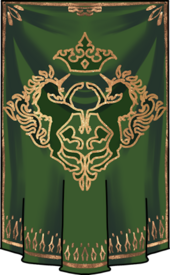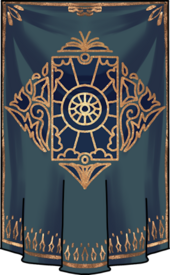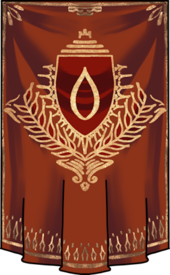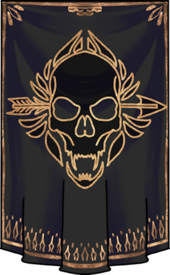More actions
Knighthood, while mostly an Ailor concept, exists across the world of Aloria in different forms. While Knighthood offers unique experiences and status, its believability must be preserved, and so the lore around it is fairly strict. Knights are divided into Realm Knights who have loose rules and obligations, and Chartered Knights in Knightly Orders that share an oath and a purpose, with each Order further subdivided into more specialized Chapters. Knighthood is a very good way to get involved in pre-existing groups and activities, guaranteeing people to connect to and a reason to log on. Knighthood also grants a unique rank system for Characters to progress up the ladder of their Order and gain privileges for being honest to their Code and effective at enforcing it. Knight roleplay does require reading, however, as Knight Characters must follow their Codes or risk expulsion.
Becoming a Knight
Knighthood is a major aspect of a Character, and for a lot of Characters, it requires specific backstory setups. The following designs exist:
- Trained Knights join their respective orders at around the age of 13, and train until graduation around 21 years old.
- Squired Knights join their orders at any age, and train under full Knights for some time until they can transition into becoming full Knights.
- Transferred Knights are either Knights who transferred from one order to another, or a Realm Knight who donned the color of a Chartered Order.
For Squired and Transferred Knights, make a Ticket to discuss with Lore Staff, as the rules concerning these cases may differ from Character to Character. Either way, all Knights can befound on the private registry of all played knights here. Only Knights of a specific order can ICly view their membership roster. Please make a Ticket with your in-game name, character application, and order chapter to be registered. All Knights must be registered.
Realm Knights

The Realm Knights are the most widely known and familiar Knights in the Regalian Empire. Realm Knights have no allegiances, but are capable arms of the law, or personally appointed by the Dukes of the Regalian Empire in reward for their military service and achievements. Realm Knights enforce the laws of the Regalian Empire and have certain military privileges while residing in Regalia, but are different from Chartered Knights (see below), who have strong thematic designs and additional responsibilities.
While Realm Knights lack a rank-up system, hierarchy, and expanded set of rights, they are a good starting point for new players looking to play "Guard-like" Characters in the city, while also avoiding becoming too associated with strong political stances. Realm Knights are politically aligned, while Chartered Knights come with a long storied history and multiple groups out for their blood. Even for players who are very familiar with the lore of Aloria, Realm Knights allow them to play a flexible Character that can nonetheless transition into one of the Chartered Orders at a later point after building comfort and rapport around them.
Chartered Knights
Chartered Knights, as opposed to Realm Knights, are Knights who belong to specific Orders with a hierarchy, internal set of rules, and special privileges. While Realm Knights provide a great starting or neutral position, Chartered Knights introduce additional functions like rank-ups, additional tasks and jobs, and political allegiances. You can transition a Realm Knight to a Chartered Knight at any time after having tried Knight Roleplay for a while.

|

|

|

|
|---|---|---|---|
| The Viridian Order is the grandfather of all Regalian Knight Orders, popularizing the term Knight, and holding the other Orders to a high standard of Honor and dignity. | The Aelrrigan Order is an Order of Knights and Mages who seek to both protect and regulate the Mage population to avert doom from magical calamity and purists alike. | The Bloodcast Order rose from instability in the Viridian Order, turning away from the wealthy and protecting the poor as the essential Hedge Knights for the people. | The Lothar Order exists as an anti-Magic and anti-Occult radical Knight Order ostensibly to hunt Vampires, but to extend that destruction to all Occult to save the world. |
Privileges and Limitations
All Knights gain certain social privileges, as well as Knighthood expectations. The expectations form through a code of conduct which requires Knights to react a certain way to some roleplay scenes, or to avoid doing a particular thing. Privileges are unique things that Knights are allowed to do that no other type of Character can do (though some overlap may exist with for example Noble House Guards). Each Knight Order is subject to the so-called "Common Knight Code", while each Order also has a separate code of conduct called the "Internal Code". Failing to live up to these Codes can result in an investigation, demotion, and in the worst case scenario, expulsion from the Order. Some Orders, like the Lothar, are exceptionally sour towards traitors, and may issue a hit-squad to take out anyone who abandons their duties.
All Knights are tasked with the duty of ensuring that each of them, regardless of order affiliation, holds to the Common Knight Code, as well as their Interal Code to a lesser degree. The latter is more complicated, because different Orders don't always understand the complex nuances of Internal Codes, or are hostile to each other's purpose. The following Order rivalries should be noted:
- The Aelrrigan and Lothar Orders have opposing views on the Occult, and both will always reject a report from the other Order's knights.
- The Bloodcast Order broke away from the Viridian Order, with both will always reject a report from the other Order's knights.
Investigations should be passed on in Staff Ticket to the respective Order Councils for judgement.
Common Knights Code
- All Knights must be loyal to the Emperor of Regalia above all, and loyal to the Regalian State. This does not mean they have to be loyal to all leaders, as sometimes, the Empire must be protected from its own agents.
- All Knights are disallowed from attacking unarmed or defenseless people. That being said, if someone intentionally throws their weapon, or turns their back to taunt, this obviously does not apply as it is tactics.
- All Knights may not act in any way to defame, degrade, or humiliate their Order, or engage in any actions that would bring shame on them or their fellows, or show weakness in the face of adversity, or combat.
- All Knights are allowed to enforce Regalian Law, but do not have to if they opt out. They must however abide by Regalian Law, though sometimes the Law can be bent, doing only what any might think the Emperor forgives.
- All Knights may not lie, deceive, or cheat in any activity in public or private. That being said, not all truths need always be said, and not all questions need to be answered if it is not honorable or virtuous to do so.
- All Knights are expected to give alms to the poor, and to protect the weak, while obeying their own Internal Code, and the purpose of their Knighthood. Inactivity and sloth to duty is considered a personal failing.
Common Knight Privileges
- All Knights are permitted to wear armor and weapons anywhere in Regalia, including Temples and burial sites and private homes, with the exception of the Imperial Palace, where Armor and Weapons must be confiscated.
- All Knights should be treated as aristocracy even if they are not. Knights can be addressed as Ser, Sera, or Dame, depending on choice of identification. They also gain a stipend for Knighthood.
Rank Up Privileges
Additional Privileges can be gained from Ranking Up. Each Knight Order has 4 ranks. The default is Knight-Sergeant. Ranks are just a mark of prestige, and do not confer authority. Knights are not obligated to listen to Player Knights of a higher Rank than them. Players with multiple Knights can only rank-up one of them. Rank-Up criteria are determined as follows:
- The first Rank-Up (to Knight-Captain) is granted if the Character is ideologically convicted to their order's code and themes, which is expressed and felt by other players in roleplay, and not secretly undermined in private.
- The second Rank-Up (to Knight-Major) is granted if the Player regularly generates independent Lore-Canon Event and Story content for their Order as a Player DM.
- The third Rank-Up (to Knight-Paladin) is granted if the Character achieves a notable Policy victory for the Order that is reflected in Lore, such as significant political defeat of a rival Order or achievement in favor to the stated goals of the order.
For every Rank-Up, the Player may choose one of the following Privileges for their Character:
- Privilege 1 an instanced room inside the Order's Knightly Chapterhouse.
- Privilege 2 an instanced Crypt room.
- Privilege 3 access to the Order's Archives (DM Ticket Bot), which may contain deeplore or useful information.
- Privilege 4 a custom Artifact with a single aesthetic Mechanic. We may decline this if unable to make one up.
- Privilege 5 immunity to Low Law and the legal permission to cast Magic, even off duty.
Transferring Knight Order
Transferring Knight Order is a somewhat controversial subject for Knights, but one that can actually occur for variety of reasons. Historically speaking, many Viridians who have grown disillusioned with their Knight Order, abandoned the Viridian Green and took up the Bloodcast Red, to become Hedge Knights instead. It should be noted that not all Orders accept transfers, and that such a decision should not be chosen lightly, as it cannot be reverted in short order. Knights may also not transfer between Orders constantly, and should aim for no more than 2 Transfers in total. Transferring can be done by submitting a Lore Staff ticket and treating it as an In Character request for a transfer in a letter, thus citing all the reasons for the transfer. Any Ranks acquired from previous Orders will be reset, but the privileges gained will not be lost. Below is a list of all Orders and their transfer opportunities.
| Viridian Order | Aelrrigan Order | Bloodcast Order | Lothar Order |
|---|---|---|---|
|
|
|
|
Nuance of Transfer and Desertion
Transferring Orders usually has no direct negative consequence, like expulsion from the Order for failing to meet requirements might have, though a Character should still expect In-Character ridicule and verbal abuse from ex-colleagues, or even being hunted down depending on the context of the transfer. Below lists the general outcome of transfers out of the different orders:
- Viridian Knights, as the oldest and most prestigious of the Regalian Knight Orders, tend to look down on those who transfer out as becoming lesser than the best. Deserters are frequently arrested and tried for the betrayal to their oath, but more often than not are 'let go' and looked down upon.
- Bloodcast Knights, as the champions of the common citizen, tend to look down on those who transfer out as becoming part of the problem of institutional tyranny. Deserters are usually institutionally ignored, unless they start acting in direct contradiction of the Bloodcast Oath, in which case they are hunted.
- Lothar Knights, believing their cause to be a righteous calling, tend to look down on those who transfer as lacking conviction, or being a traitor to purism. It is not uncommon for ex-Lothar to be hunted down by their former order due to falling to occult corruption/sympathy. Deserters are hunted by the Council, to ensure they do not betray secrets of the Order.
- Aelrrigan Knights, as examples of ethical magic control, tend to look down on those who transfer as lacking discipline. It is not uncommon for some ex-Aelrrigans to be hunted down as Renegade Mages due to the danger their magic may have when not subject to Aelrrigan morals. Deserters are usually 'let go' and looked down upon, unless they take with them some Artifact or important magical knowledge, in which case they are hunted as Renegades.